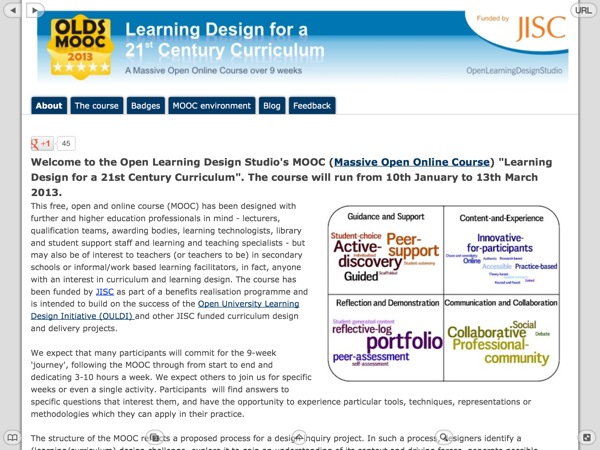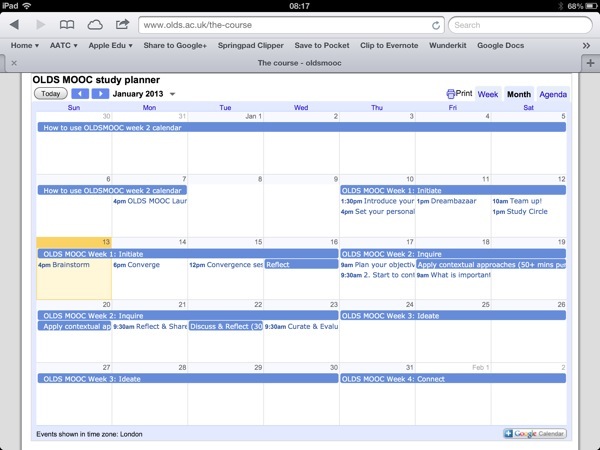I have undertaken 3 MOOCs over the last 18 months, partly to scope any potential MOOC development ideas and also to explore the concepts and theories behind MOOCs, but also for my own professional development.
My most recent MOOC sign up is the OLDS MOOC – http://www.olds.ac.uk/ which is the JISC funded MOOC led by the Open University but has contributions from other HEI’s. As with most MOOCs it is free to register and participate and is dominated by web based communication and activity. It is largely delivered through the OU’s Cloudworks (a well intentioned site for educators but the most active users are those form the OU in my experience).
So……….I signed up with my usual enthusiasm and then……………….dismay and disengagement. Once I had managed to get (back) into my Cloudworks account I then headed for the OLDS MOOC course page and to my dismay I came across the “schedule” – an overwhelming fairly prescribed, almost daily list of activities and tasks which I knew I would not be able to sustain.
So it got me thinking, just how much time would I be willing to invest in a course (MOOC or any other) as a development activity with no formal accreditation? (By the way this course has Open Badges but as of yet they have limited validity beyond the Open Badge community so this is not a key motivator for me). I also pondered whether I would have quite as easily “quit” the course if I had made some monetary contribution and/or it had a formal (accredited?) outcome?
I was also put off by the MOOC environment section which reads;
“Every MOOC is different. Because the structure of this MOOC is highly collaborative and project based, we have chosen to use an open, distributed learning platform; that is we have used a variety of different open platforms including Google+, Cloudworks, Slideshare and YouTube etc to support collaborative learning.
From the information many of you gave us, we know that on the whole you are an experienced and technologically confident group so you might well have already established tools that you would prefer to use and that’s fine too.”
This started the alarm bells for me – potentially meaning I will have to work across multiple platforms thus increasing my workload in trying to patch it all together.
The previous MOOCs I attended were much more flexible in time and more consistent in design and delivery (this is particularly important when juggling the day job and family around learning and development activities). So I came up with some of my own thoughts for what I would be willing to commit to a MOOC just for the “love of learning”.
Time: 2-5 Hours per week
Delivery: Single platform for the delivery (one point of access) but broadening discussions through social media with predominantly asynchronous engagement. (Although Cloudworks is a single platform it still feels like a disparate set of pages to me)
Outcomes: Clear intentions & objectives (what will I potentially learn from this?)
Resources: What types of resources will I be using (video/text/audio etc).
Assessment: Is there any assessment task? If so, in what form?
Feedback: Will there be any opportunities for feedback – if so how and when?
Some people may argue that MOOCs should offer a more flexible approach to learning and that prescribing the above may be restrictive, but if I am to invest time and energy into a learning activity I would like an overview of some kind to aid my decision making process.
Upon reflection this does seem rather critical of the OLDS MOOC and it is not intended to be. It’s just that this MOOC is not for me, in the same way that some formal education is not for me. I applaud the approach being taken – the more we experiment with online learning the more we learn. What works for one, might not work for another and we should embrace and support diverse approaches and learn from our successes & failures.
My only other question is do I need to tell anyone I have decided not to commit to the MOOC? Will I be put on a MOOC banned list?





No responses yet